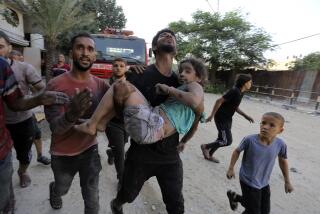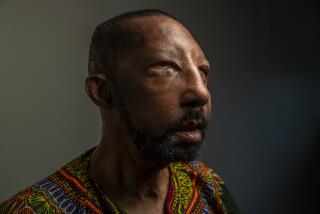Doctor’s Dream Is Fulfilled
The summer before Mitchell Cairo began his college studies, he worked for a roofing company in a run-down part of Chicago.
It changed his life.
“During that summer, I saw a wide variety of people who lacked medical care. It was so obvious, just walking the streets you could see it,” Cairo said. “That motivated me.”
The lack of medical care for adults was pitiable, but the suffering of children seemed worse. Cairo answered what he felt was a calling to become a physician, pledging to help the youngest victims of disease.
It has now been a decade since Cairo, 45, performed Orange County’s first bone-marrow transplant on a 2 1/2-year-old Santa Ana girl suffering from neuroblastoma. The malignant cancer started at the base of her brain and spread to her bones and lungs.
“She’s alive and well,” Cairo said, sitting in an office plastered with thank-you cards, letters, crayon-illustrated artwork and photos from his grateful young patients. “The transplant saved her life.”
It was an auspicious beginning for the bone-marrow transplant program he oversees at Children’s Hospital of Orange County, where more than 200 children and young adults have received bone-marrow transplants. But the last 10 years have not been without heartbreak.
In a case that brought worldwide attention to the need for bone marrow donors from minorities, Michelle Carew, the 18-year-old daughter of Angels coach Rod Carew, came to Cairo for help in September 1995. She was suffering from recently diagnosed non-lymphocytic leukemia, one of the most aggressive strains of the disease.
Because of Michelle’s rare genetic background--her father is black with West Indian and Panamanian heritage and her mother white, of Russian-Jewish ancestry--the search for matching bone marrow was unsuccessful. She underwent a relatively rare umbilical cord blood transplant, but chemotherapy treatments had sapped her strength. She died four weeks later, in April.
Children’s Hospital of Orange County was awarded a $5.5-million grant earlier this month from the National Heart, Lung and Blood Institute to establish a center for umbilical cord blood collection, research and transplants in conjunction with St. Joseph Hospital. Blood will also be collected for the program from Long Beach Community Hospital and Huntington Memorial Hospital in Pasadena.
In February 1995, Cairo supervised the first umbilical cord blood transplant in Southern California on a 4-year-old leukemia patient. The procedure was a success and the hospital has since performed a dozen more such transplants.
Cairo sees the grant as an opportunity to fulfill his earliest ambitions in medicine, to help as many sick children as possible. The transplants will also be conducted on adults.
“This kind of opportunity is rare,” said Cairo, who will oversee the program. “We hopefully will have some impact in helping patients not only locally but worldwide. It appears now that there will only be three cord blood collection centers in the United States.”
Umbilical cord blood contains the same type of stem cells that are found in bone marrow. But because immune cells in the umbilical cord blood are less developed than those in adult bone marrow, researchers hope there will be a lower risk of rejection.
“How close a match the cord blood has to be is still unknown,” Cairo said. “We don’t yet have the answer to that question.”
Both kinds of transplants are intended to revive the immune system and stimulate the growth of blood cells in patients who have been given high doses of drugs and radiation to kill cancer cells.
“Clearly over the last 20 years, the win-loss ratio has shifted, where we’re now curing 60% to 70% of children with cancer, compared to 20% or 30% when I started in the field,” Cairo said. “There are many times when we’re saddened and disillusioned because we lose patients we had hoped we could cure.
“But the rewards of seeing a child recover, grow up, go through school and stay in contact with us are invaluable. Children have so much spirit, they tolerate therapy so much better than adults. There’s such a tremendous feeling of accomplishment to cure a child of a terminal illness.”
(BEGIN TEXT OF INFOBOX / INFOGRAPHIC)
Profile: Mitchell Cairo
Age: 45
Hometown: Chicago
Residence: Santa Ana
Family: Wife Ellen; two sons, ages 5 and 7
Education: Bachelor’s degree from University of Wisconsin; medical degree from UC San Francisco School of Medicine; American Cancer Society research fellowship at Indiana University
Background: Assistant professor of pediatrics at UC Irvine for five years; director of blood and bone marrow transplantation at Children’s Hospital of Orange County since 1986; chairman of pediatrics and director of cancer research at CHOC; co-director of county regional bone marrow transplant program and medical director of bone marrow transplant and collection program at CHOC and St. Joseph Hospital
On healing the young: “Children have so much spirit, they tolerate therapy so much better than adults. There’s such a tremendous feeling of accomplishment to cure a child of a terminal illness.”
Source: Mitchell Cairo; Researched by RUSS LOAR / For The Times
Los Angeles Times
More to Read
Sign up for Essential California
The most important California stories and recommendations in your inbox every morning.
You may occasionally receive promotional content from the Los Angeles Times.










